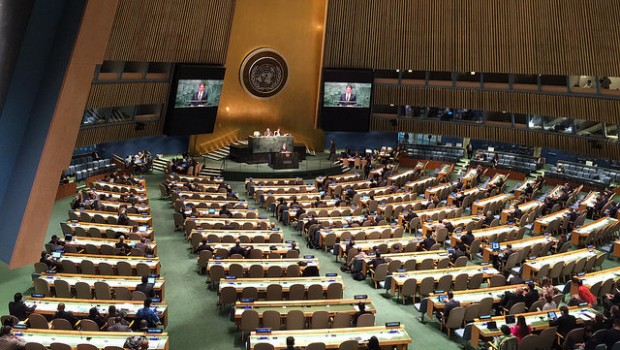Beatrice Fihn | International Campaign to Abolish Nuclear Weapons
As the 2015 NPT Review Conference ended, over 100 states had endorsed the humanitarian pledge, committing to work for a new legally binding instrument for the prohibition and elimination of nuclear weapons.
The pledge reflects a fundamental shift in the international discourse on nuclear disarmament over the past five years. It is the latest indication that a majority of governments are preparing for diplomatic action after the Review Conference.
The wide and growing international support for this historic pledge sends a signal that governments are ready to move forward on the prohibition of nuclear weapons, even if the nuclear weapon states are not ready to join.
But for the nuclear-armed states, none of this seemed to matter. Barely any of them mentioned these new revelations, and in absurd statements, some of the nuclear-armed states (and their nuclear dependent allies) refuted any mention of the risk of or the catastrophic humanitarian impact of a nuclear detonation.
“There has been no new information” on the humanitarian impact of nuclear weapons “in decades,” the French ambassador claimed repeatedly, rejecting the evidence that existing nuclear arsenals pose an increasing risk. Researchers, journalists, whistleblowers, UN agencies and the presenters at the Vienna Conference on the Humanitarian Impact of Nuclear Weapons assert the opposite.
While the United States, the United Kingdom and Canada declared failure over the Middle East, the draft outcome document was deeply flawed on disarmament. It contained no meaningful commitments on nuclear disarmament, rolls back on previous agreements and was not negotiated amongst states parties. The closing plenary showed a wide range of governments from all regions highlighting that the text fell dramatically short of making credible progress.
But more significantly, with the nuclear weapon states continuing to defend their possession, no possible outcome document can tackle the fundamental problems around nuclear weapons.
The use of a nuclear weapon on a major populated area would immediately kill tens if not hundreds of thousands of people – mothers, fathers and children.
Hundreds of thousands more would be alive – but injured. Blinded, burned and crushed.
The effects of just a single nuclear weapon are shocking and overwhelming enough. They go far beyond what can be considered acceptable.
The blinding flash leaves people sightless, the massive blast will levels cities, the searing heat and spreading fires will melt steel, engulf homes and can coalesce into a firestorm that will suck the air from anyone still breathing, and the survivors of these effects may yet be poisoned by radioactive fallout – that breaks down their bodies over the days and weeks that.
The long-term consequences would significantly harm the environment, development, and the economy across boarders and generations.
These weapons fundamentally violate the principles of humanity. They are morally unacceptable, illegitimate instruments of terror that must be banned.
A ban on nuclear weapons is not just about implementing article VI of the NPT. A ban on nuclear weapons is a necessary precondition for preventing the humanitarian consequences of nuclear weapons.
It has been made clear that the nuclear weapon states are not interested in making any new commitments to disarmament, so now it is up to the rest of the world to start a process to prohibit nuclear weapons. The humanitarian pledge is the basis we need for these negotiations to begin.


![[Original text] Humanitarian pledge on nuclear disarmament, signed by 108 countries](https://www.cndpindia.org/wp-content/uploads/2015/06/ICANPhilippines-150x150.png)